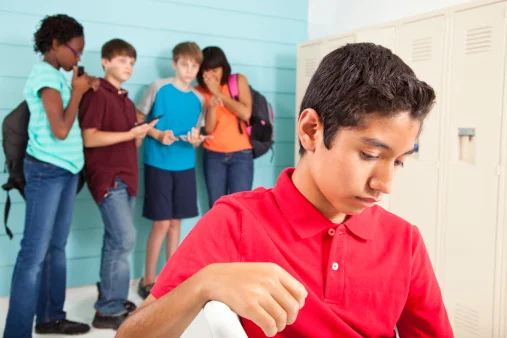+1 845 259 2974 (11 a.m to 7 p.m CST)
Why Do Teens Bully? Reasons and Solutions

Bullying among teens is a significant issue that affects many young people across the world. It involves unwanted, aggressive behavior that implies a power imbalance. Bullying can happen in person, online, or through other digital platforms, making it a pervasive problem. This behavior can include making threats, spreading rumors, attacking someone physically or verbally, and excluding someone from a group on purpose.
Addressing bullying is crucial because its effects go beyond the immediate harm. It can lead to long-term psychological impacts, such as depression, anxiety, and low self-esteem in victims. For bullies, it can signal underlying issues that need attention, such as the need for power or struggles with empathy. Furthermore, the rise of digital platforms has made it easier for bullying to continue outside of school hours, often without the direct knowledge of adults.
The importance of tackling teen bullying lies in creating a safe and supportive environment for all young people. By understanding the reasons behind bullying and implementing effective solutions, including the use of parental control apps, we can help reduce its occurrence and impact. This is essential for fostering a culture of respect and empathy, where teens feel valued and supported in their growth and development.
Reasons Why Teens Bully
There are plenty of reasons that could lead the kids to take this path. Here are a few of those reasons for you to get the idea:
Seeking Power and Control
In many cases, teens turn to bullying to establish dominance and control over their peers. This desire for power often stems from feelings of insecurity or inadequacy in other areas of their lives. By demeaning or dominating others, bullies create a facade of strength and confidence that masks their own vulnerabilities.
This behavior is not just about the bully feeling superior; it's also about making others feel inferior, establishing a clear hierarchy where the bully sits at the top. Unfortunately, this quest for control can lead to a cycle of aggression, where the bully continues to seek out victims to maintain their sense of authority.
Influence of Social Groups
The social dynamics within teen groups play a significant role in bullying behavior. The desire to fit in and be accepted by peers can push teens to engage in behaviors they might not consider if acting alone. This pressure to conform to group norms can make the act of bullying seem like a necessary step to gain or maintain social status.
Teens navigating the complex social hierarchies of adolescence may find themselves participating in or initiating bullying to avoid becoming victims themselves. The influence of these groups highlights the importance of peer relations in teen bullying, showcasing how the desire for acceptance can sometimes lead to harmful actions.
Family Issues
The role of the family cannot be underestimated when it comes to understanding why teens bully. The behaviors and dynamics displayed within the home environment can significantly influence how a teen interacts with others outside of it. For instance, exposure to aggressive behavior, lack of empathy, or even neglect at home can normalize such conduct for children.
As a result, these teens may replicate these behaviors with their peers, using bullying as a learned strategy for interaction or conflict resolution. This cycle of learned aggression underscores the critical role of family in shaping a teen's understanding of healthy versus harmful behaviors.
Digital Age Challenges
The advent of social media and digital communication has transformed the landscape of teen bullying, introducing new challenges and dynamics. The anonymity and detachment provided by digital platforms can embolden individuals to engage in bullying without the immediate consequences of face-to-face interactions.
This digital veil can make bullies feel invincible and detached from the harm they cause. Moreover, the pervasive nature of digital platforms means that bullying can follow victims everywhere, escaping the confines of physical spaces like schools. This 24/7 access to potential victims amplifies the effects of bullying, making it more difficult for teens to find respite and increasing the potential for lasting harm.
The Effects of Bullying on Victims and Bullies
It is important to realize that bullying affects both bullies and the victim. Here is how:
Emotional and Psychological Impact
Bullying leaves deep emotional and psychological scars on both victims and bullies. Victims may experience a range of negative emotions, including fear, anger, sadness, and loneliness. These feelings can lead to anxiety, depression, and a decreased sense of self-worth. The constant stress of being bullied can also affect their ability to concentrate, learn, and interact with others, causing further isolation.
Bullies, on the other hand, may develop issues related to aggression, impulsivity, and a lack of empathy. While they may seem to benefit from their actions in the short term, gaining power or status, they often struggle with deeper emotional and relational problems. This can manifest as difficulty in forming healthy relationships, increased risk of substance abuse, and engagement in other risky behaviors.
Long-term Consequences
The effects of bullying don't just stop when the bullying stops; they can have long-lasting consequences for both the victim and the bully. Victims of bullying may carry emotional scars into adulthood, leading to ongoing issues with trust, self-esteem, and social anxiety. They might also experience chronic depression and have a higher risk of suicidal thoughts or actions.
For bullies, the long-term consequences can include legal troubles, as their aggressive behaviors may continue into adulthood, leading to criminal activity. They might also face challenges in maintaining stable, healthy personal and professional relationships. Studies have shown that individuals who bully others during their teenage years are more likely to exhibit anti-social behavior, including domestic violence, in later life.
This dual impact highlights the importance of addressing bullying behavior early, not only to protect victims but also to help bullies change their behavior before these patterns become deeply ingrained.
The Role of Parents and Guardians
Parents and guardians play a crucial role in preventing and addressing bullying. Their involvement can make a significant difference in a teen's life, both in preventing them from becoming bullies and in supporting them if they are victims.
Open Communication
Open communication is the foundation of trust between parents and teens. It involves actively listening to teens, being approachable, and creating a safe space for them to express their feelings and experiences. This trust encourages teens to share their concerns about bullying, whether they're experiencing it or witnessing it happen to others.
Parents should:
- Encourage daily conversations about their day, feelings, and friendships.
- Be non-judgmental and supportive, offering guidance when needed.
- Discuss the importance of empathy and understanding towards others.
Setting Examples
Parents are the first role models for behavior. The way parents handle conflict, treat others, and express emotions teaches teens how to act in their own social interactions. By modeling respectful behavior, parents can show teens positive ways to deal with disagreements and differences. This includes:
- Demonstrating kindness and respect in all interactions, both within the family and with others.
- Handling disagreements constructively, without resorting to insults or aggression.
- Showing empathy and consideration for the feelings of others.
Using Parental Control Apps Wisely
Parental control apps can be a valuable tool in monitoring online activities and protecting teens from cyberbullying. However, it's important to balance supervision with privacy, ensuring teens feel trusted and respected. Parents should:
- Choose apps that promote safety without overly invading privacy.
- Discuss the use of these apps with their teens, explaining their purpose is to protect, not to invade privacy.
- Encourage responsible online behavior and awareness of the impact of their actions on others.
By taking an active role in their teen's life, parents and guardians can significantly reduce the risk of bullying and help build a generation of respectful and empathetic individuals.
Understanding why teens bully and addressing these behaviors is crucial for creating safer and more supportive environments for our youth. From seeking power and control to the influence of social groups, family issues, and the challenges presented by the digital age, the reasons behind bullying are complex. The effects of bullying extend far beyond the immediate moment, impacting both victims and bullies in profound ways, including emotionally, psychologically, and through long-term consequences.
Combatting teen bullying requires a multifaceted approach that includes education and awareness, fostering positive social environments, the strategic use of parental control apps, and access to professional help and counseling. Parents and guardians play an essential role in this effort, through open communication, setting positive examples, and wisely using tools to monitor online activity.























